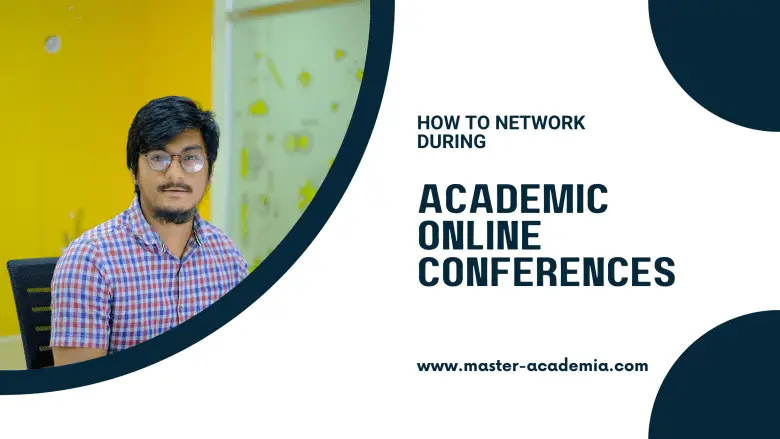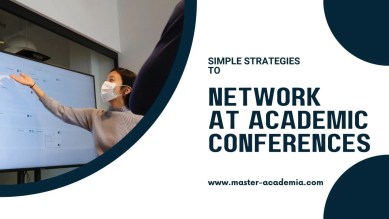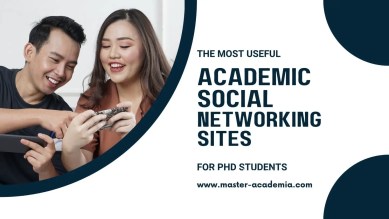
Academic conferences are increasingly held online or in a hybrid format. How to network during online academic conferences? Find out more about virtual networking ideas and strategies during academic online conferences.
Contents
- Why online academic conferences are (partly) here to stay
- #1 Create a full conference participant profile
- #2 Actively participate in online conference sessions
- #3 Reach out to interesting speakers after their online presentation
- #4 Invite people to connect with you during your ow presentation
- #5 Participate in online networking events offered by the conference
- #6 Ask someone out for a virtual lunch or coffee break
Why online academic conferences are (partly) here to stay
The Covid19 pandemic created a new era of online collaboration. Born out of necessity, academic online conferences are likely here to stay. At least in a hybrid format.
Increased awareness and urgency of the climate emergency make growing numbers of academics question their regular international travels. The feeling of guilt about conference carbon footprints existed before the pandemic. But now we know that online conferences are indeed viable alternatives.
Online conferences are also much more inclusive. They tend to have lower entrance fees, make it more feasible for people from all parts of the world to attend and are easier to combine with care responsibilities.
Before attending a conference, PhD and master’s students should always think about how to get the most out of a conference. A major concern regarding online conferences is the networking part.
Academic conferences allow for small talk between sessions, coffee breaks to meet new people and spontaneous interactions, which are all important factors of network building. But what to do if the conference is online?
#1 Create a full conference participant profile
Networking during an academic online conference starts with your online presence. Many conferences use online conference systems with a virtual environment that allows participants to listen to plenaries as well as to drop in and out of conference sessions. Some even have accompanying mobile apps.
Virtual conference environments tend to allow participants to create participant profiles. These profiles are visible to other participants, show up in conference sessions, or when participants chat with each other.
It is important to take the time to create a full conference participant profile! Include a professional picture, and your institutional affiliation, and provide a link to your online presence. This can be, for instance, your university profile, your ORCID ID, or your LinkedIn or Google Scholar profile.
Furthermore, include a few lines about yourself and your research. Don’t write a novel, but tell people what your research is about. You can also mention that you are happy to connect and chat with people, to remove a barrier for others to contact you.
Maybe your next online conference does not have any fancy equipment or systems, but simply uses Zoom. Even then, you should make sure to have a profile picture as part of your Zoom account, and that your whole name and affiliation are visible when you participate in a session.
#2 Actively participate in online conference sessions
Successful networking during online conferences starts with active participation during conference sessions. To start with the basics: Please leave your camera on! Even better, nod and smile!
Not only does this small act of kindness makes a world of difference for the presenters, but it is horrible to talk to a screen without seeing anyone. People will also notice and remember you better. And they will be more inclined to google your name or check out your profile.
Additionally, ask several questions during the Q&A after presentations. Be cautious though and don’t ask questions just for the sake of asking questions. Quality over quantity.
That said, many PhD and master’s students are too shy or insecure to ask any questions at all. Even though they probably have very good ones to ask. If that’s the case for you, try to push yourself a bit. Challenge yourself to ask a few questions during online conference sessions.
#3 Reach out to interesting speakers after their online presentation
When attending online conference presentations, you may come across some really interesting speakers and would like to connect or stay in touch with them.
It is probably best to reach out to these speakers within 24 hours. You can refer to the specific conference session and the presentation that you attended. In that way, they will have an easier time placing and remembering you.
Cold emailing is always a bit scary, but you may be surprised by positive reactions. When reaching out to someone unannounced, be explicit about your objective.
Do you just want to compliment the speaker on their presentation? I am sure they will appreciate it. However, the chance of creating a lasting connection and not being forgotten within a week is small.
Therefore, when possible, ask for something explicit and think of a shared activity. For example, you could explain that you conduct similar research and would love to exchange insights. Or you could invite the speaker to a small event that you are organising. The effort will pay off.
#4 Invite people to connect with you during your ow presentation
If one of your objectives is to grow your network, make sure you are actively inviting people to connect with you.
During your conference presentation, emphasise that you are happy to answer any questions or further discuss your topic even after the conference session. Explain how people can get in touch with you.
If you use presentation slides, end with a slide that contains information for session participants on how to get in touch with you. Include your email address, and your LinkedIn profile or Twitter handle if you use them for professional purposes.
You can even go a step further and tell your session participants that you are, for instance, free during the conference lunch break and invite anyone interested to an informal video call to continue the discussion.
#5 Participate in online networking events offered by the conference
This is a no-brainer. If you want to network, and a conference offers its online networking event, make sure to participate!
Yes, it can be uncomfortable at first, especially for a more introverted person. But trust me, at the beginning it is a little awkward for everyone. It gets better with practice.
Acknowledging the specific challenges and needs of early career scholars, many larger conferences also organise specific activities for PhD students. And sometimes, for master students as well.
These targeted events are extremely valuable, even when they are online. Connecting with those who are at a similar stage in their careers does not provide immediate job opportunities or the like. But don’t underestimate the value of exchange and the opportunity to form friendships.
Furthermore, remember that you are all at the beginning of your careers, and you will all grow professionally.
#6 Ask someone out for a virtual lunch or coffee break
Finally, if you want to network, be proactive and ask someone out for a virtual lunch! Or coffee break. Or whatever you would like to call it.
You will likely be surprised by how much people appreciate such a request. And the worst thing that can happen is that the person you ask says no. So be a courageous person and take matters into your own hands.
Who to ask? Maybe you chatted with someone nice during an online academic speed-dating event, organised by the conference. Maybe you liked the presentation a lot and would like to connect with the speaker. Or maybe you joined a session for early career researchers and can ask if anyone is interested to meet online for a casual chat.
During online academic conferences, many people have the urge to network and also simply to have a nice chat. Don’t necessarily invite the keynote speakers of the online conference to meet during lunch. They will most likely be busy and not respond to your request. If you are a PhD student, try asking another PhD student, a postdoc or a lecturer/assistant professor.



